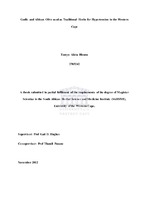| dc.description.abstract | Hypertension is a common chronic health problem worldwide due to contributing factors such as obesity, physical inactivity, unhealthy diet and changes in lifestyle. The standard of care for hypertension in South Africa is prescription medication, as well as a stepwise programme; this treatment approach is for the treatment of hypertension according to severity using diuretics, beta-blockers, vasodilators in a stepwise progressive manner. In South Africa,traditional herbal medicines have been used to treat many ailments especially hypertension.Garlic and African olive has been reported as herbal medicines that have anti-hypertensive properties and may be used to control hypertension, either individually or in combination.The objective of this study is to 1) prevalence of these traditional herbal medicines will be investigated and 2) determine the prevalence of garlic and/ or African olive use among hypertensive patients lieu of/or in combination with prescription medication.
The study design was cross-sectional, comprising of two phases. Phase one was the
administration of questionnaires concerning the participants‘ demographics, medical/clinical history, chronic illness and traditional herbal treatment. One hundred and eighty participants from Prospective Urban Rural Epidemiological study (PURE) cohort were administered questionnaires. Of the 180 participants, 139 indicated that they are hypertensive, 30 hypertensive participants were selected to participate in the in-depth interviews. Phase two was divided into two parts which were detailed interviews including in-depth interviews and a focus group discussion. The focus group discussion was conducted with a convenience sample of 10 hypertensive patients who were available on the day of data collection. The
questionnaire data was analysed with the Statistical Package for the Social Sciences (SPSS) and the interviews and focus group discussion was analysed using thematic content analysis.The results show that the participants with hypertension who are on prescription medication are also using traditional herbs, garlic and African olive as part of a dualistic health care treatment for their hypertension. The use of garlic is more prevalent than the use of African olive, as African olive was not well known among the participants.The results will facilitate in the acknowledgment of traditional herbal medicine use for hypertension, as either a home remedy for (other) chronic conditions or treatment in combination with prescription medication. It also highlights the necessity to educate participants and healthcare providers in the use of traditional herbal medicine. Furthermore,
healthcare workers needs to be trained about THM and should also be obligated to ask about traditional herbal medicine among their patients. | en_US |

